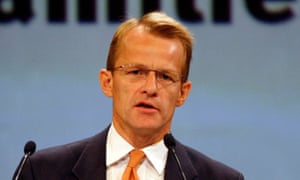
Barack Obama opposed David Cameron holding a referendum on Britain’s membership of the EU, and his ambassador in London expressed fears that the prime minister’s approach was losing the UK influence inside Europe, according to a former minister in the coalition government.
The revelation came ahead of the US president’s visit to Britain next week, during which he will make the case for British membership of the EU and celebrate the Queen’s 90th birthday at a lunch in Windsor Castle on Friday.
Obama plans to use his visit and a speech on US European relations to help rescue Cameron from the consequences of a decision with which he never agreed.
David Laws, the former Liberal Democrat cabinet minister and author of a new history of the coalition, said Cameron repeatedly admitted to his deputy, Nick Clegg, he knew he was taking a risk with the referendum but was only staging one in order to keep Ukip at bay and retain party unity.
Laws reveals that Clegg formed an alliance with the Americans, including the then US ambassador to London, Louis Susman, to try to persuade Cameron his increasingly Eurosceptic stance was a profound strategic mistake based on short-term party management. Clegg advised Susman to persuade Obama to tell Cameron directly he was making a mistake, Laws claims.
The ambassador told Clegg the US administration was worried that “you guys may soon not count in Europe any more”. In particular, Laws says Susman expressed his concerns that “David Cameron was not being listened to on Europe, and that the UK was no longer acting as a bridge to Europe for America”.
According to Laws, Clegg told Susman this message needed to go directly from the president to the prime minister with something said in public. Days before Cameron made his speech calling for a referendum, Washington was tipped off, according to Laws, and Obama’s officials made statements urging the UK to remain in the EU, and for the EU not to distracted by institutional issues.
Now with the referendum campaign under way , Obama is seen in Downing Street as possibly the last major influential independent voice that has yet to be deployed in support of Britain remaining a member of the EU. He is seen as likely to be influential in galvanising younger voters who are more supportive of EU membership, but disinclined to make the effort to vote.
Obama is also being urged to make a positive internationalist case for British membership of the EU that goes beyond saying it is in the US national interest that the UK remains a strong voice in the EU.
It is still under discussion whether Obama should follow his trade representative, Michael Froman, in warning that Britain outside the EU would not be able to negotiate its own tariff deals, but would instead face the prospect of the same high rates as Russia and China. The US is Britain’s biggest export market after the EU, buying more than $54bn (£35bn) in goods from the UK in 2014.
US and UK diplomats are weighing how Obama should echo Froman’s warning without appearing to be threatening its oldest ally.
Boris Johnson, the London mayor, accused Obama of hypocrisy for calling on the UK to accept a loss of sovereignty, as a member of the EU, that would never be tolerated in the US.
He told the Evening Standard: “I honestly don’t mind the idea of him joining the debate. Where we do part company, and where I do mind, is that it is plainly hypocritical for America to urge us to sacrifice control – of our laws, our sovereignty, our money and our democracy – when they would not dream of ever doing the same.”
Nigel Farage, the Ukip leader, waded into the row by describing Obama as the most anti-British president in history. “Mercifully, this American president, who is the most anti-British American president there has ever been, won’t be in office for much longer, and I hope will be replaced by somebody rather more sensible when it comes to trading relationships with this country,” Farage said.
Washington has also been warned that the Labour opposition leader, Jeremy Corbyn, critical to the outcome of the vote according to some polls, opposes the transatlantic trade and investment partnership. In a speech this week expressing his clear support for continued membership of the EU, Corbyn described TTIP as a huge cause for concern, and something that should be defeated.
A petition has been launched by 38 Degrees calling on Obama ahead of his visit to drop the TTIP talks. Many trade unionists also oppose TTIP, claiming it will lead to enforced privatisation of public services. However, Obama is still hoping to secure the EU-US trade deal before the end of his presidency in January, and is using a meeting in Germany on 24 April with Angela Merkel and EU commissioners to try to end the deadlock in the negotiations.
Froman – who was in London at the beginning of this week for a further round of talks on the deal – has been blunt about the consequences of a Brexit. He said in 2105: “I think it’s absolutely clear that Britain has a greater voice at the trade table being part of the EU, being part of a larger economic entity. We’re not particularly in the market for FTAs with individual countries. We’re building platforms … that other countries can join over time.”
If Britain left the EU, Froman said, it would face the same tariffs and trade barriers as other countries outside the US free trade network.













No comments:
Post a Comment